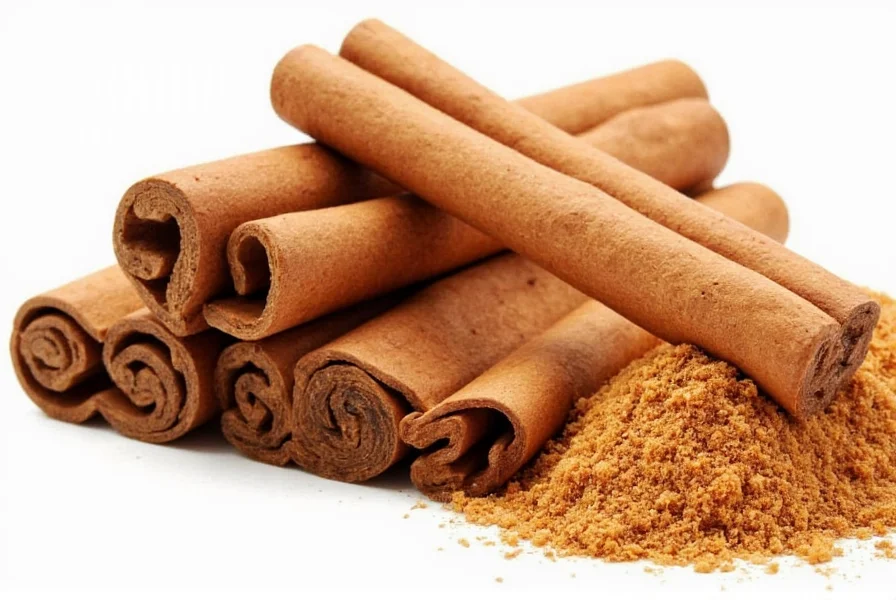Based on current scientific evidence, Ceylon cinnamon (Cinnamomum verum) is considered the best cinnamon for regular health use due to its significantly lower coumarin content compared to Cassia cinnamon, while still providing valuable health benefits including blood sugar regulation and antioxidant properties.
Understanding Cinnamon Varieties and Their Health Implications
When exploring natural remedies for health improvement, cinnamon frequently appears as a top contender. This ancient spice has gained modern scientific attention for its potential health benefits, but not all cinnamon varieties offer the same advantages. Understanding the differences between types is crucial for making informed decisions about incorporating cinnamon into your wellness routine.
Major Cinnamon Types: A Comparative Analysis
Cinnamon isn't a single uniform product but rather comes from different tree species, resulting in distinct varieties with varying chemical compositions. The two primary types available in most markets are Ceylon cinnamon and Cassia cinnamon, each with unique characteristics that affect their health implications.
| Characteristic | Ceylon Cinnamon | Cassia Cinnamon |
|---|---|---|
| Scientific Name | Cinnamomum verum | Cinnamomum cassia |
| Origin | Sri Lanka, India | China, Indonesia |
| Appearance | Multiple thin, tightly rolled layers (like cigar paper) | Single thick, rough卷 layer |
| Taste Profile | Milder, sweeter, more complex | Stronger, hotter, more pungent |
| Coumarin Content | Approximately 0.017g/kg (very low) | Approximately 63.34g/kg (very high) |
| Market Availability | Less common, typically more expensive | Most common (80-90% of US market) |
The Critical Role of Coumarin in Cinnamon Selection
Coumarin content represents the most significant health consideration when choosing cinnamon for regular consumption. This naturally occurring compound, while present in many plants, can cause liver damage when consumed in excessive amounts over time. Cassia cinnamon contains substantially higher levels of coumarin compared to Ceylon cinnamon, making the latter the safer choice for daily use.
The European Food Safety Authority established a tolerable daily intake (TDI) of 0.1mg of coumarin per kilogram of body weight. For a 60kg (132lb) person, this translates to approximately 6mg of coumarin daily. A single teaspoon (2.6g) of Cassia cinnamon contains about 5.8-12.1mg of coumarin—potentially exceeding the safe daily limit in just one serving. In contrast, the same amount of Ceylon cinnamon contains only trace amounts of coumarin.
Evidence-Based Health Benefits of Cinnamon
Research indicates several potential health benefits associated with cinnamon consumption, though the evidence quality varies by claim:
Blood Sugar Regulation
Multiple studies suggest cinnamon may help improve insulin sensitivity and lower blood glucose levels. A comprehensive 2015 meta-analysis published in the Journal of the Academy of Nutrition and Dietetics found that cinnamon supplementation significantly reduced fasting blood glucose levels in people with type 2 diabetes and prediabetes. However, the American Diabetes Association doesn't currently recommend cinnamon as a standard treatment due to inconsistent study results.
Antioxidant Properties
Cinnamon ranks among the most antioxidant-rich spices. Research published in Oxidative Medicine and Cellular Longevity identified over 80 different phytochemicals in cinnamon, with particularly high levels of polyphenols that combat oxidative stress. These compounds may contribute to cinnamon's potential anti-inflammatory effects.
Heart Health Considerations
Preliminary research suggests cinnamon may positively affect several cardiovascular risk factors, including triglycerides, LDL cholesterol, and blood pressure. However, most studies have been short-term or conducted on animals, so more human research is needed to confirm these effects.
Practical Guidance for Safe Cinnamon Consumption
When incorporating cinnamon into your health regimen, consider these evidence-based recommendations:
- Choose Ceylon for daily use: If consuming cinnamon regularly (more than 1-2 times weekly), select Ceylon cinnamon to minimize coumarin exposure
- Moderation with Cassia: If using Cassia cinnamon, limit consumption to no more than 1/2 teaspoon (1g) daily to stay within safe coumarin limits
- Check product labels: Look for "Ceylon," "true cinnamon," or Cinnamomum verum on packaging
- Consider your health status: Individuals with liver conditions should be particularly cautious with Cassia cinnamon
- Quality matters: Select reputable brands that specify cinnamon type and may provide third-party testing information
Addressing Common Misconceptions
Several myths persist about cinnamon's health effects. While cinnamon shows promise in certain areas, it's essential to maintain realistic expectations:
Despite popular claims, cinnamon is not a cure for diabetes. While it may help with blood sugar management as part of a comprehensive approach, it shouldn't replace prescribed diabetes medications. Similarly, claims about cinnamon's ability to cause significant weight loss lack strong scientific support.
The "cinnamon challenge"—attempting to swallow a spoonful of cinnamon without water—poses serious health risks including choking and lung damage, and provides no health benefits. This dangerous trend should be avoided entirely.
Who Should Exercise Caution with Cinnamon?
Certain populations should be particularly careful with cinnamon consumption:
- Individuals with liver disease or compromised liver function
- People taking medications metabolized by the liver
- Those on blood-thinning medications (cinnamon may enhance their effects)
- Pregnant women (consult with healthcare provider before regular use)
- People scheduled for surgery (discontinue use at least 2 weeks prior)
As with any supplement or dietary change, consult with a healthcare professional before using cinnamon therapeutically, especially if you have underlying health conditions or take medications.
Integrating Cinnamon into a Healthy Lifestyle
Cinnamon works best as part of an overall healthy lifestyle rather than as a standalone solution. Consider these practical applications:
- Add 1/4-1/2 teaspoon of Ceylon cinnamon to morning oatmeal or smoothies
- Use as a sugar alternative in coffee, tea, or baked goods
- Incorporate into savory dishes like curries and stews for added flavor complexity
- Combine with other beneficial spices like turmeric and ginger for synergistic effects
Remember that while cinnamon offers potential health benefits, it should complement—not replace—established healthy habits including balanced nutrition, regular physical activity, and adequate sleep.

Research Limitations and Future Directions
While current research on cinnamon is promising, several limitations exist. Many studies have been conducted in test tubes or on animals rather than humans. Human studies often involve small sample sizes, short durations, or inconsistent cinnamon dosages and types. More rigorous, long-term human trials are needed to fully understand cinnamon's therapeutic potential and optimal usage parameters.
Future research may clarify which specific cinnamon compounds are most beneficial, how they interact with other dietary components, and whether certain populations benefit more than others from cinnamon supplementation.
Conclusion: Making an Informed Choice
When selecting the best cinnamon for health purposes, Ceylon cinnamon emerges as the superior choice for regular consumption due to its favorable safety profile and retained health benefits. While Cassia cinnamon offers similar flavor and some health properties, its high coumarin content makes it less suitable for daily use. By understanding the differences between cinnamon varieties and consuming them appropriately, you can safely incorporate this ancient spice into your modern wellness routine.
Is Ceylon cinnamon really better than Cassia for health?
Yes, Ceylon cinnamon is generally considered better for regular health use because it contains significantly lower levels of coumarin—a compound that can cause liver damage in high amounts. While both types offer similar health benefits including potential blood sugar regulation, Ceylon's much safer coumarin profile makes it the preferred choice for daily consumption.
How much cinnamon should I consume daily for health benefits?
For Ceylon cinnamon, up to 1-1.5 teaspoons (3-4.5g) daily appears safe for most adults. For Cassia cinnamon, limit consumption to no more than 1/2 teaspoon (1g) daily due to its high coumarin content. Always consult with a healthcare provider before using cinnamon therapeutically, especially if you have liver conditions or take medications.
Can cinnamon help with blood sugar control in diabetes?
Research suggests cinnamon may help improve insulin sensitivity and lower fasting blood glucose levels, with multiple studies showing modest benefits. However, it should not replace prescribed diabetes medications. The American Diabetes Association doesn't currently recommend cinnamon as a standard treatment due to inconsistent study results, but it may be a beneficial addition to a comprehensive diabetes management plan.
How can I tell if I'm buying Ceylon cinnamon instead of Cassia?
Look for specific labeling that says "Ceylon," "true cinnamon," or Cinnamomum verum. Ceylon cinnamon typically has a lighter brown color, multiple thin layers that look like rolled paper, and a more delicate, sweeter flavor compared to the darker, thicker, single-layer bark of Cassia. Reputable health food stores and specialty spice retailers are more likely to carry authentic Ceylon cinnamon.
Are there any risks associated with consuming too much cinnamon?
Yes, excessive cinnamon consumption—particularly Cassia cinnamon—can lead to coumarin toxicity, which may cause liver damage. Symptoms of excessive intake include nausea, vomiting, diarrhea, and in severe cases, liver dysfunction. The "cinnamon challenge" poses serious respiratory risks including choking and lung inflammation. People with liver conditions, those taking certain medications, and pregnant women should exercise particular caution with cinnamon consumption.
Frequently Asked Questions
Is Ceylon cinnamon really better than Cassia for health?
Yes, Ceylon cinnamon is generally considered better for regular health use because it contains significantly lower levels of coumarin—a compound that can cause liver damage in high amounts. While both types offer similar health benefits including potential blood sugar regulation, Ceylon's much safer coumarin profile makes it the preferred choice for daily consumption.
How much cinnamon should I consume daily for health benefits?
For Ceylon cinnamon, up to 1-1.5 teaspoons (3-4.5g) daily appears safe for most adults. For Cassia cinnamon, limit consumption to no more than 1/2 teaspoon (1g) daily due to its high coumarin content. Always consult with a healthcare provider before using cinnamon therapeutically, especially if you have liver conditions or take medications.
Can cinnamon help with blood sugar control in diabetes?
Research suggests cinnamon may help improve insulin sensitivity and lower fasting blood glucose levels, with multiple studies showing modest benefits. However, it should not replace prescribed diabetes medications. The American Diabetes Association doesn't currently recommend cinnamon as a standard treatment due to inconsistent study results, but it may be a beneficial addition to a comprehensive diabetes management plan.
How can I tell if I'm buying Ceylon cinnamon instead of Cassia?
Look for specific labeling that says "Ceylon," "true cinnamon," or Cinnamomum verum. Ceylon cinnamon typically has a lighter brown color, multiple thin layers that look like rolled paper, and a more delicate, sweeter flavor compared to the darker, thicker, single-layer bark of Cassia. Reputable health food stores and specialty spice retailers are more likely to carry authentic Ceylon cinnamon.
Are there any risks associated with consuming too much cinnamon?
Yes, excessive cinnamon consumption—particularly Cassia cinnamon—can lead to coumarin toxicity, which may cause liver damage. Symptoms of excessive intake include nausea, vomiting, diarrhea, and in severe cases, liver dysfunction. The "cinnamon challenge" poses serious respiratory risks including choking and lung inflammation. People with liver conditions, those taking certain medications, and pregnant women should exercise particular caution with cinnamon consumption.











 浙公网安备
33010002000092号
浙公网安备
33010002000092号 浙B2-20120091-4
浙B2-20120091-4